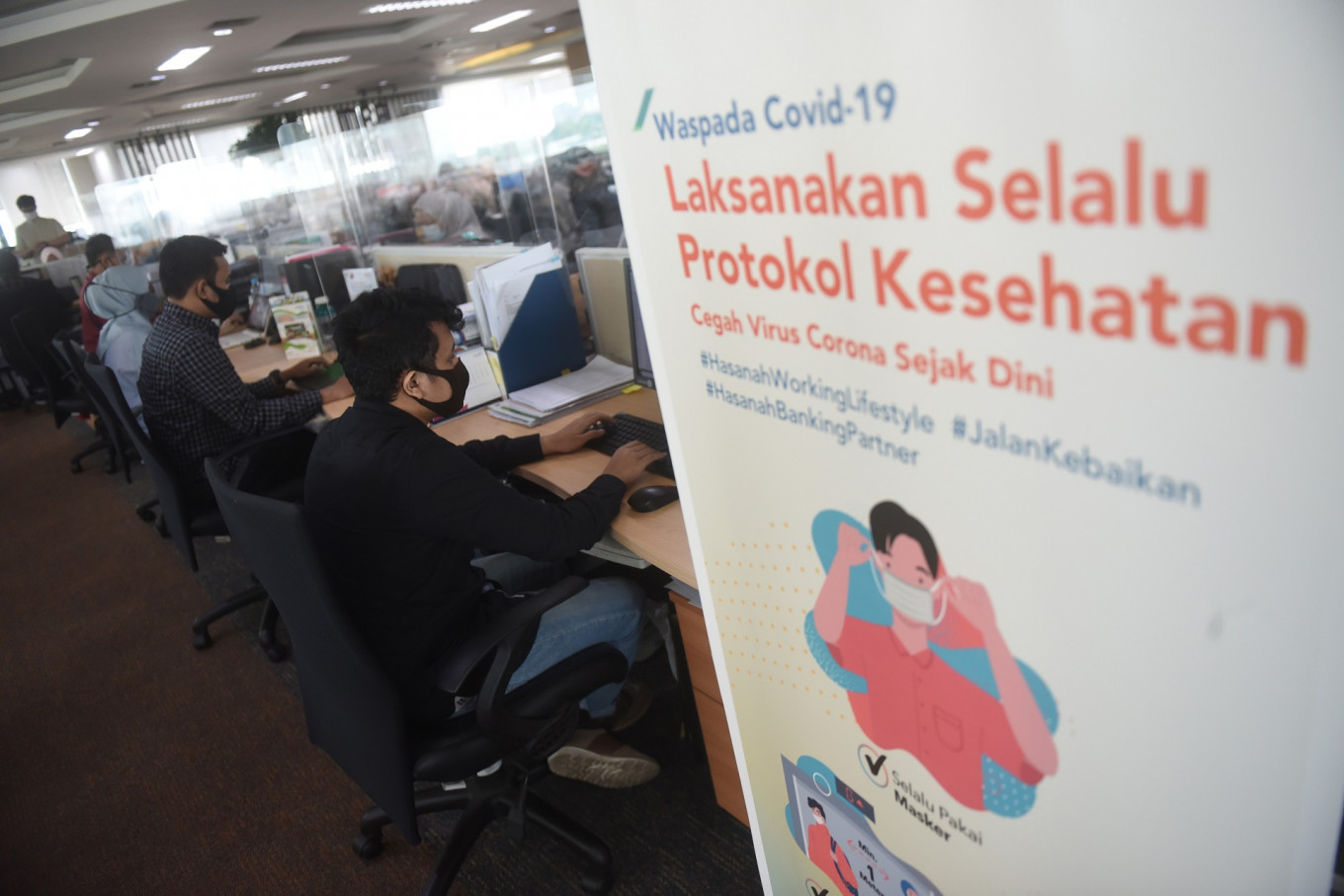Popular Reads
Top Results
Can't find what you're looking for?
View all search resultsPopular Reads
Top Results
Can't find what you're looking for?
View all search resultsBoost social aid to offset PSBB, says Indef
Izzudin Farras of Indef said on Thursday that the lack of a social cushion could pose a risk to the economy, as the capital city accounted for nearly one fifth of Indonesia’s gross domestic product (GDP).
Change text size
Gift Premium Articles
to Anyone
T
he government will need to augment its social safety net to offset the economic blow of the reimposed large-scale social restrictions (PSBB) in Jakarta, an economist with the Institute for Development of Economics and Finance (Indef) has said.
Izzudin Farras of Indef said on Thursday that the lack of a social cushion could pose a risk to the economy, as the capital city accounted for nearly one fifth of Indonesia’s gross domestic product (GDP).
“If Jakarta’s economy remains negative in the third quarter, with the apparent impact since July and August, it will hit the national economy and indicate recession at the national level,” Izzudin said in a virtual discussion.
Izzudin added that the government needed to improve its social assistance programs by placing more emphasis on the millions of vulnerable members of the middle class who were prone to falling into poverty because of the COVID-19 pandemic. Policymakers should expand and update the Social Affairs Ministry’s Integrated Data for Social Welfare (DTKS), he said, to cover 60 percent of the nation’s poorest people, an increase from the bottom 40 percent currently accounted for.
“With updates and a large amount of data, the government can make social assistance better targeted to middle-lower-class people,” said Izzudin.
Jakarta Governor Anies Baswedan announced on Sept. 9 that large-scale social restrictions (PSBB) would be reimposed in the city, replacing the “transitional PSBB” that had prevailed since June, over concerns that Jakarta would run out of isolation beds by Sept. 17 if no additional restrictions were put in place.
As of Thursday, the capital had recorded about 58,500 confirmed COVID-19 cases, accounting for a quarter of the national tally of more than 232,600.
Jakarta is the largest regional contributor to the national economy. The area’s regional domestic product accounted for 17.17 percent of the country’s GDP in the second quarter, Statistics Indonesia (BPS) data shows. The capital is followed by East Java (14.6 percent) and West Java (13.45 percent), which are also virus epicenters.
So far, the government has earmarked Rp 204.95 trillion (US$13.8 billion) for social safety net programs in its COVID-19 response plan, including for direct cash transfers and the Family Hope program, out of the total relief budget of Rp 695.2 trillion.
Indonesia’s economy shrank by 5.32 percent year-on-year (yoy) in the second quarter of this year. The government expects the economy to contract 1.1 percent at worst or grow 0.2 percent at best in 2020.
The economic impact of the so-called micro-scale social restrictions (PSBM) in Jakarta’s satellite cities, including Bogor, Bekasi and Depok, may not be as bad as the restrictions in the capital, according to Izzudin.
Jakarta’s neighboring province of West Java had reported about 15,500 confirmed cases as of Thursday, making it the fourth-hardest-hit province.
Berly Martawardaya, research director at Indef, said the government could adopt a risk-factor-based approach to making lockdown decisions to save lives while keeping the economy afloat.
“If the cases do not slow down in two weeks, the second PSBB will likely be extended. If they decline, the reopening should be based on risk factors so we can stop the pandemic and save the economy – in that order,” he said.
The Jakarta administration, he suggested, could close industries that made little economic contribution and had a high risk of transmission, such as entertainment and recreation.
Under PSBB, 11 essential sectors – including health, food, energy, communications, finance, logistics and daily needs retail – are allowed to operate at 50 percent of capacity.
Government offices and private companies outside these sectors must implement work-from-home policies and allow no more than 25 percent of their employees to work in the office at the same time.
In the recently published Asian Development Outlook 2020 Update, the Asian Development Bank (ADB) stated that continued disruption from the pandemic would have “severe implications for growth” in Indonesia, with domestic demand and export prospects dampened as a consequence.
Read also: Prolonged pandemic could derail Indonesia’s recovery, ADB, economists warn
“Basically, there isn’t a trade-off [between public health and the economy]. This is a health crisis. Unless you can address this effectively, you can’t have a full recovery,” ADB director for macroeconomics research Abdul Abiad said on Tuesday.
“We have to remember that containment has many different dimensions, and if you focus on the things that help with the outbreak and don’t hurt the economy so much, you will do well,” Abdul added.










